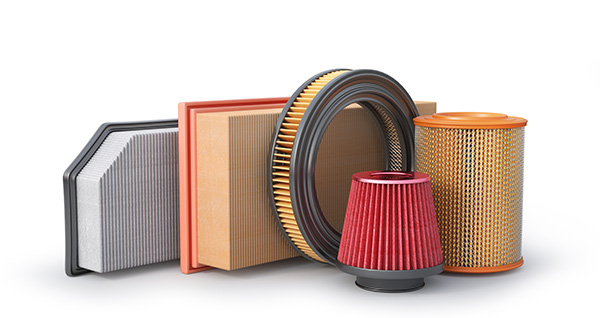
When you think about maintaining your car, things like oil changes, tire rotations, and brake checks probably come to mind. But have you ever considered the role your car's filters play? Car filters work quietly in the background to keep your vehicle running by blocking out harmful contaminants. Each filter has its own specific function, and understanding the different types can help you ensure your car is performing at its best.
Engine Oil Filter
The engine oil filter is perhaps the most well-known of all car filters. Its job is pretty straightforward: it filters the oil in your engine, removing dirt, debris, and metal particles. This keeps the oil clean and ensures that it can do its job of lubricating the engine components. Over time, as oil circulates through the engine, it picks up contaminants that, if left unchecked, could cause severe damage to the engine’s internal parts. The oil filter catches these contaminants, allowing only clean oil to pass through.
Ignoring your oil filter’s health can lead to inefficient engine performance or even catastrophic engine failure if dirty oil clogs the system. Most vehicle manufacturers recommend changing the oil filter with every oil change, which is generally every 5,000 to 7,500 miles.
Air Filter
The air filter plays an equally important role by ensuring that the air entering your engine is clean. Your car’s engine needs a mix of fuel and air to function properly. The air filter prevents dust, dirt, leaves, and other debris from entering the engine. A clogged or dirty air filter restricts airflow, causing your engine to work harder, reducing performance, and increasing fuel consumption.
A simple air filter replacement can make a big difference in your vehicle’s performance, and experts recommend checking it during regular maintenance intervals, especially if you drive in dusty conditions.
Cabin Air Filter
While the engine air filter protects the engine, the cabin air filter protects you. This filter ensures that the air circulating through your car’s heating, ventilation, and air conditioning (HVAC) system is free of dust, pollen, and other allergens. A dirty cabin air filter can lead to unpleasant odors, poor airflow, and an increase in allergy symptoms for you and your passengers.
If you notice that the air inside your car smells stale or the airflow from the vents is weaker than usual, it might be time to replace your cabin air filter. Generally, it should be changed every 15,000 to 30,000 miles, but it’s always a good idea to check your owner’s manual for specific recommendations.
Fuel Filter
Another essential filter is the fuel filter. This filter is responsible for keeping debris and contaminants out of your fuel system. Whether your car runs on gasoline or diesel, the fuel filter ensures that only clean fuel reaches your engine. Over time, fuel can pick up particles from the tank or corrode the fuel lines, and the filter works to prevent this from causing engine problems.
A clogged fuel filter can lead to engine misfires, rough idling, or even prevent your car from starting. Replacing your fuel filter at regular intervals—usually every 30,000 miles—can help you avoid these issues and maintain optimal engine performance.
Transmission Filter
The transmission filter may not get as much attention as other filters, but it’s equally important. This filter works with the transmission fluid to keep the transmission system running efficiently by filtering out contaminants like dirt and metal shavings. A clean transmission filter ensures smooth shifting and helps prolong the life of your vehicle’s transmission.
Like other filters, transmission filters can become clogged over time, affecting the performance of the transmission. It's recommended to replace the transmission filter during a transmission service, which typically occurs every 30,000 to 60,000 miles, depending on your vehicle.
Why Replacing Filters is Essential
Each filter in your car plays a critical role in keeping the vehicle's systems running efficiently. Whether it's filtering air, oil, or fuel, these components are designed to protect sensitive parts from harmful contaminants. Neglecting filter replacements can lead to reduced performance, increased fuel consumption, and expensive repairs down the road.
Regularly replacing your car’s filters based on the manufacturer's recommendations can help extend the life of your vehicle and ensure a safer, smoother driving experience. It’s a simple, affordable task that can prevent much bigger problems from occurring in the future.
Don’t let dirty filters compromise your car’s health. Schedule a maintenance appointment at Davenport Motor Company today, and we’ll take care of your filters and more so you can drive worry-free!